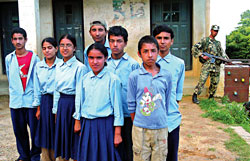|
|
| LOST GENERATION: In 2004, these students were taken away by Maoists from Chhaimale, 25km south of Kathmandu, made to walk for three days and forced to listen to revolutionary speeches |
While taking a well-deserved break from meddling in the country\'s internal affairs, the Hand (Foreign) couldn\'t help but notice the recent dragooning of children into the so-called People\'s Army. (Didn\'t we just witness the signing of a Comprehensive Peace Agreement banning all such activity?!) Was this another example of Nepal\'s astonishing ability to sustain dual realities concurrently, or a brazen act of Maoist duplicity?
Settling firmly on the latter, it dawned on me that this latest tsunami of abductions and forced recruitment, appropriately labelled \'crimes against humanity\' by UN reps, brings into sharp focus a devastating policy the Maoists have employed for the last ten years.
For the youth of Nepal this is not a new phenomenon. Under the Rana Oligarchy, education was forbidden to all but the sons of nobility. This policy of keeping the citizens \'simple\' proved successful for the ruling class (and debilitating for everyone else). The Rana hereditary prime ministers ruled virtually unopposed for over a century. Upon their overthrow in the 1950s, Nepal faced the daunting task of setting up an entire educational system from scratch. 
Now, as if emulating the very history books they\'ve banned, the Maoists systematically deny Nepali children their inherent right to education. The war waged against the state has consistently targeted the school system through constant strikes, forced closures, and kidnapping of students for indoctrination, leaving the country with another lost decade on the record. Where\'s the merit of using children as fodder in the name of a failed, patently bankrupt ideology? Or any ideology, for that matter.
Official Maoist policy dictates all education must be state-run, exposing a fear of independent thought the Ranas would applaud. Throughout the conflict, private schools have been singled out for special attention, characterised by extortion on a massive scale. The rebels vehemently oppose such institutions and righteously demand their abolition, but they\'ve found them convenient sources of free money.
As with the Maharajas of yore, exceptions are always made for the elite, in this case Maoist. Children of high-ranking cadre study in exclusive institutions abroad while their parents wage war on the schooling system at home.
Just in case we forget that irony is alive and well in the teetering kingdom, it is worth noting that the single most damning legacy of Rana misrule has proved a boon to the Maoist cause. Nepal\'s pitiful literacy rate�far below that of most Asian nations�has provided an audience unused to critical thinking, less likely to question rhetoric, and easy to brainwash. The politburo must count themselves lucky that major global trends�such as the collapse of communism�have passed by un-noticed.
While the Maoist leadership acted out childish fantasies of epic struggle from comfortable sanctuaries in Foreign Land, (any similarity to the author\'s nom de plume is purely coincidental � or is it?), the result is Nepal\'s youth have again been denied the chance for a normal childhood.
If the Rana regime left a land woefully ill-prepared for the future as a modern nation-state, some forty years later the Maoists have spawned a traumatised cohort trained only in sloganeering, coercion, and warfare.
Those cynically used by men seeking power will be left with nothing to show for it. Accustomed to free chicken at the barrel of a gun, and bereft of skills for gainful employment, many potentially productive members of the much-trumpeted \'New Nepal\' are likely to resort to crime sans ideology as a means of survival. Unfortunately, that\'s all their gang boss gurus have taught them.
Your opinionated scapegoat willingly concedes he may know less than he lets on, especially concerning byzantine Nepali politics. That said, Foreign Hand is dead sure about a few things. The trust granted to a nation\'s political class by its people includes the duty to ensure access to decent education. Enabling the young with the means to go forth and prosper is a primary responsibility of our leaders, real and presumed.
In this respect, the Maoists have failed as miserably as the Ranas before them, wilfully sacrificing yet another generation to a narrow, deeply-flawed political agenda. Those with a gimlet eye will ruefully observe that even after all these years, the empowering nature of education still terrifies those who would be king.



